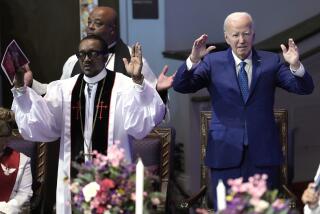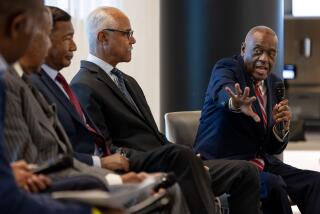Doctor Works to Overcome Reluctance Among Blacks to Donate Organs
- Share via
PITTSBURGH, Pa. — Dr. Clive O. Callender says he has been sneered at, sworn at and nearly swung at, all in the cause of organ donation and transplantation.
His self-appointed mission is to persuade more blacks to donate their organs. Perhaps more than any other group, experts say, blacks are reluctant to offer their organs to others and seem equally uneasy accepting strangers’ organs to save themselves.
Callender’s strategy is to chip away at the religious myths and superstitions that he says account for this reluctance, along with low transplant awareness and lifelong distrust of doctors.
“Blacks aren’t donating. We’re taking; we’re not giving back,” says Callender, one of a handful of black transplant surgeons in the United States.
‘Help Themselves’
“Blacks have more renal failure than any other group because of the high incidence of high blood pressure,” he says. “Since we have a unique predilection for high blood pressure and for kidney failure, it is even more important that blacks should become interested in doing something to help themselves.
“We’re a part of the solution and we’re a major part of the problem because we aren’t helping each other.”
Since he began transplanting kidneys 13 years ago at Howard University Hospital in Washington, the 50-year-old surgeon says he has encountered considerable resistance in trying to persuade blacks to donate loved ones’ organs.
His greatest obstacles have been “deep-rooted” beliefs that the body must remain intact for life after death and that organ donation is “anti-God.”
Opposition has been so fierce at times, in fact, that Callender has been forced to pass up potential organ donors. Twice last year he did so out of concern for the surviving spouse’s safety.
‘Ain’t No Way’
“The brothers and sisters said (to the wife), ‘There ain’t no way you’re going to give our brother’s organs, and if you do, something’s going to happen to you,’ ” he recalled.
“Because of the intimidation and the hostility, we had to allow that husband’s organs to not be used. We were concerned that the wife would become a donor.”
He has also watched many blacks languish on dialysis rather than undergo a kidney transplant.
“There was a time when I would go into a hospital and I would be virtually run out of the room because of the hostility,” Callender says.
Nearly 60% of dialysis patients in Washington are black, and the capital has the highest rate of kidney disease in the country, Callender said. Yet nearly 60% of the patients who receive kidney transplants there are white.
“It’s pitiful that in the District of Columbia, a predominantly black area, twice the number of white patients are transplanted than blacks,” he said. For the most part, he said, it is the blacks’ choice.
Problems More Likely
Blacks who do choose transplantation are 10% to 20% more likely than whites to experience rejection or other problems, Callender says, partly because they usually must rely on white organs that do not always provide as close an antigen match. But the surgeon said this seems to be a problem only in some blacks. Many tolerate white organs without complications.
Dr. Harry Ward, medical director of renal transplantation at Harbor-UCLA Medical Center in Torrance, Calif., is critical of doctors, black and white, who are afraid to talk to the family about organ donation.
“They’re afraid they’re going to get their heads blown off,” said Ward, who is half black and half Japanese.
Such misunderstandings on both sides have prompted Callender, Ward and others to devote more time to informing blacks about organ donation and educating the medical profession about minorities’ fears of donating.
- In Washington, the D.C. Organ Donor Project, supported by the National Kidney Foundation, has been working since 1982 with the Bureau of Motor Vehicles Services in distributing information about organ donation to people applying for driver’s licenses. Such prominent blacks as former U.S. Sen. Edward Brooke of Massachusetts and professional basketball player Rick Mahorn appear on posters promoting the cause, and Callender addresses groups every chance he gets.
The result has been a tenfold increase in the number of people signing organ donor cards.
- In Los Angeles, a black transplant coordinator hired in February under a federal grant is working to dissolve cultural and religious barriers to organ donation. Successful black transplant patients also are going public to show that “organs do not simply go to people who live in Beverly Hills,” Ward said.
- In Chicago, a federally funded task force of local black leaders has tackled the subject. “Many times it’s been middle-class whites looking at the problem, and I don’t think we understand the black community that well,” said Dr. James Wolf, chairman of Northwestern University’s transplantation division.
- In Detroit, medical researchers are studying how patients with kidney failure view transplantation and how black kidney recipients fare. They are targeting churches, community centers and housing projects in an awareness blitz.
- In Atlanta, black Councilman Robb Pitts, acting on his own behalf, has been spreading the message at black churches since March. Every Sunday, he visits a different congregation and is granted a few minutes in the pulpit to discuss organ donation. He also hands out copies of a brochure he prepared.
Until these special efforts, most donor awareness campaigns were aimed at whites, said Barbara Schulman, senior transplant coordinator for the Regional Organ Procurement Agency of Southern California.
The black community and other minorities, she said, have not had the same “extensive education and exposure to this matter.”
The American Society of Transplant Surgeons stresses a tactful approach in the hospital to persuade a donor’s family. “That’s step No. 1, regardless of race,” said Dr. Robert J. Corry, the group’s president.
‘More Distrust’
Ward agrees that donor reluctance is widespread across the spectrum of society, “but in the minority community, you just have more in the way of ignorance of this problem, more distrust of the system, other cultural and religious myths to overcome.”
A 1986 Gallup survey of public attitudes toward transplantation and organ donation showed that 34% of whites and 16% of blacks said they were very willing to donate their organs.
The poll reported that 73% of whites said they were “very likely” to donate a relative’s organs, contrasted with 49% of blacks. It showed that 48% of whites said they were very likely to donate their children’s organs, as opposed to 28% of blacks.
The survey also found that blacks were less inclined than whites to discuss organ donation with their families and were less supportive of state laws requiring hospitals to approach relatives of brain-dead patients about organ donation. So far, 29 states have such a law.
850 Surveyed
Jeffrey Prottas of Brandeis University’s Health Policy Center surveyed 850 Americans, about a fifth of them black. Even after allowing for educational and economic disparities, he found that blacks were still less likely than whites to donate organs.
Determined to narrow the gap, Callender traveled to eight major cities last year as spokesman for the Dow Chemical Co.’s Take Initiative Program on transplantation.
The initial reaction was much the same at every stop and echoed the sentiments of blacks surveyed by his hospital. Many thought that donations would violate their religious beliefs, he said, and some worried that doctors would be more interested in getting their organs than saving their lives.
Some dislike the idea that their organs might go to whites, Callender said.
“This is a bit preposterous,” Callender said, pointing out that 97% of the organs that are transplanted come from white donors.
Only a Third Procured
Dr. William Eagles of the United Network for Organ Sharing estimates that organs were procured from only about a third of the nation’s approximately 20,000 potential donors last year. He said donations could jump 10% if blacks offered organs as often as whites.
More than 9,000 people, all of whom are being kept alive through dialysis, await kidney transplants at any time in the United States, the Organ Procurement and Transplant Network said. Dialysis and kidney transplants are covered under Medicare.
About 350 others wait for new hearts, and another 300 line up for livers. For them, there is no other option. And unless their insurance covers transplants or they qualify for Medicare or state Medicaid, they must come up with as much as several hundred thousand dollars on their own or die.
“That’s what’s happening with many blacks,” Callender said, because they do not have insurance.
To prevent this “greater tragedy,” Callender is establishing a liver transplant program at Howard University Hospital this spring for patients refused elsewhere because of insufficient funds. He recently spent three months at Presbyterian-University Hospital of Pittsburgh learning the procedure.
“How we’ll do it is a question, but that’s something we’re committed to do,” he said.
More to Read
Sign up for Essential California
The most important California stories and recommendations in your inbox every morning.
You may occasionally receive promotional content from the Los Angeles Times.













